 There can be no more rewarding experience for the library music composer than seeing an entire cinema audience simultaneously try to identify your music on Shazam.
There can be no more rewarding experience for the library music composer than seeing an entire cinema audience simultaneously try to identify your music on Shazam.
A trailer can make or break a blockbuster movie, and the choice of music can make or break a trailer. Chances are that music will be library music...
Conjure in your head the gravelly voice of Don LaFontaine, who voiced thousands of movie trailers until he died in 2008. “In a world... where movie studio billions can be made or lost by their trailers, where gravelly voiceovers that explain the plot have gone out of fashion, the soundtrack isn’t finished and wouldn’t be powerful enough for the trailer anyway, there is one unlikely hero that can save the day: library music.”
Amazing visuals, movie stars and plot giveaways aside, the music used in Hollywood movie trailers is under an awful lot of pressure to carry the message and excite the masses into going out to watch the films. So where does this music come from, how is it chosen, how much money does it make — and how can you write that music and put that money in your pocket?
This article, the sixth instalment in a major series all about library music, delves deep into the world of trailer music, bringing in the combined wisdom of the major Hollywood studios, Hollywood trailer houses (independent ad agencies who create the trailers for the studios), trailer music libraries, who license the music to the trailer houses, and trailer music composers, who write the music for the trailer music libraries. Along the way we will also take a look at the wider picture: where trailer music came from, and how it is also used in TV and adored by fans around the world.
As it’s a large topic and my own area of expertise, this trailer music special will be divided in two. This month we’ll learn about how the industry works, and next month we’ll find out all about composing the music, and offer some advice on how to get into the industry.
Trailer Music Is Library Music!
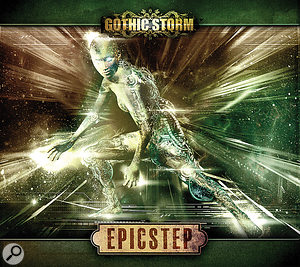 Our 2014 EpicStep (Epic Dubstep) album was the coolest thing in trailer music, for two months.Many people assume that the music in trailers comes from the films, but in fact, the film score often hasn’t been written when the trailers are aired, and even if it was, it would lack the instant impact and excitement needed. So the majority of music used in trailers is in fact library music especially designed for trailers. Generally, library music is music that has been written to a brief, aiming to capture a mood or genre, not written to any specific visuals. Library music albums are released and made available to worldwide video producers, in this case the LA trailer houses who create the trailers, so they can search for and find tracks that suit their current movie marketing campaigns. As an example of a trailer music library, take a look at the web site of my trailer-specialist Gothic Storm company (www.gothic-storm.com).
Our 2014 EpicStep (Epic Dubstep) album was the coolest thing in trailer music, for two months.Many people assume that the music in trailers comes from the films, but in fact, the film score often hasn’t been written when the trailers are aired, and even if it was, it would lack the instant impact and excitement needed. So the majority of music used in trailers is in fact library music especially designed for trailers. Generally, library music is music that has been written to a brief, aiming to capture a mood or genre, not written to any specific visuals. Library music albums are released and made available to worldwide video producers, in this case the LA trailer houses who create the trailers, so they can search for and find tracks that suit their current movie marketing campaigns. As an example of a trailer music library, take a look at the web site of my trailer-specialist Gothic Storm company (www.gothic-storm.com).
Apart from library music, other options for trailer editors are commercial music (music released the old-fashioned way by artists through record labels) and custom music especially created for the trailer. As we saw in the fourth instalment of this series, commercial music can be great, but is expensive and hard to clear, while custom music is also expensive and can be slow to produce. This means that ready-made, pre-cleared and lower-priced library music is often the best option for busy and budget-constrained editors. The same tensions apply with trailers, which is why library music is the most common option for trailer editors.
Holly Williamson, Vice President of Music at the LA trailer house Ignition Creative (and owner/CEO of Moon & Sun, a recently launched production music library) says: “We use library music because it’s affordable, the clients can get all the rights they need and the production quality is better than ever.”
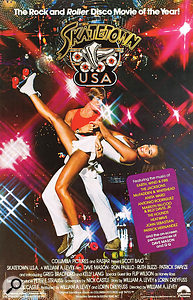 The cool, epic world of trailer music began in Spandex. On roller skates.Allison Terry at the LA trailer house Soapbox agrees: “We tend to use more library music because it seems to be more readily available to us, and the quality has only gotten better over the years.”
The cool, epic world of trailer music began in Spandex. On roller skates.Allison Terry at the LA trailer house Soapbox agrees: “We tend to use more library music because it seems to be more readily available to us, and the quality has only gotten better over the years.”
Trailer Of The Past
Until the ’70s, trailers used music directly from the film score or from other, earlier films, usually as the backing to a voiceover. This changed in the late ’70s when the composer John Beal was asked to create an original custom piece of trailer music for Skatetown, USA, a cheesy roller-disco flick featuring Patrick Swayze.
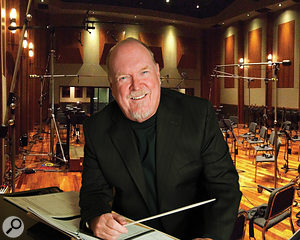 Composer John Beal was the originator of trailer music as a genre, and remains one of its leading lights.As the composer told the Guardian in 2011, “I realised the trailer was not being served as well as the picture was,” and developed a style that matched the footage perfectly. He went on to become the number-one trailer music composer, scoring over 2000 trailers from then until the present day with credits including Star Wars, JFK and The Matrix.
Composer John Beal was the originator of trailer music as a genre, and remains one of its leading lights.As the composer told the Guardian in 2011, “I realised the trailer was not being served as well as the picture was,” and developed a style that matched the footage perfectly. He went on to become the number-one trailer music composer, scoring over 2000 trailers from then until the present day with credits including Star Wars, JFK and The Matrix.
A new trend for specialist trailer library music emerged in the late ’90s to early 2000s. This was triggered by a combination of better supply, with new, high-quality music coming through, and greater demand, which saw studios wanting great, pre-cleared music with lower budgets. The first generation of these dazzling new trailer music libraries included Immediate Music, Brand X, X-Ray Dog, Audiomachine and Two Steps From Hell.
 Jeff Fayman is a co-founder of Immediate Music, one of the first trailer music companies.Immediate Music co-founder Jeffrey Fayman tells us about their origins: “Initially for Immediate Music in the middle ’90s our primary source of income was from custom scoring to picture, which was a 24/7, round-the-clock, stressful adventure. Hence our name Immediate Music, because we’d get calls from our clients at 6pm telling us they needed a huge trailer track replaced for a mix by 10am the next morning — and in those days synths, sound libraries and samples were much more primitive than the incredible arsenal of sounds available to composers today.
Jeff Fayman is a co-founder of Immediate Music, one of the first trailer music companies.Immediate Music co-founder Jeffrey Fayman tells us about their origins: “Initially for Immediate Music in the middle ’90s our primary source of income was from custom scoring to picture, which was a 24/7, round-the-clock, stressful adventure. Hence our name Immediate Music, because we’d get calls from our clients at 6pm telling us they needed a huge trailer track replaced for a mix by 10am the next morning — and in those days synths, sound libraries and samples were much more primitive than the incredible arsenal of sounds available to composers today.
“We then eventually transitioned to becoming a more bona fide ‘trailer library’, although at the time, there really wasn’t such a classification, and the word ‘library’ had a bad elevator-music connotation. But, for us, it made more sense to take the time to develop new tracks that numerous clients could preview and license if they felt it was appropriate for their projects.”
 Chris Field composed the Lord Of The Rings trailer track ‘Gothic Power’.A key early composer of epic trailer music is Christopher Field who, in 1999, created a classic called ‘Gothic Power’. A restless, stirring track with gothic choirs which sounds like O Fortuna on steroids, it not only established the epic trailer sound but changed his life too, as he tells us: “A friend of mine was starting a trailer music library, heard what I was doing, and asked me to write some music for the first CD. The company would be called X-Ray Dog Music. I didn’t know what trailer music was, and it was a new genre at the time. I liked that it was a new genre because I could be creative and experimental. I quickly learned about adding some breaks and big endings. It was a challenge for me and I became obsessed with it.
Chris Field composed the Lord Of The Rings trailer track ‘Gothic Power’.A key early composer of epic trailer music is Christopher Field who, in 1999, created a classic called ‘Gothic Power’. A restless, stirring track with gothic choirs which sounds like O Fortuna on steroids, it not only established the epic trailer sound but changed his life too, as he tells us: “A friend of mine was starting a trailer music library, heard what I was doing, and asked me to write some music for the first CD. The company would be called X-Ray Dog Music. I didn’t know what trailer music was, and it was a new genre at the time. I liked that it was a new genre because I could be creative and experimental. I quickly learned about adding some breaks and big endings. It was a challenge for me and I became obsessed with it.
“By the third X-Ray Dog Music release, entitled Sit Up And Listen, I had written a piece called ‘Gothic Power’. I remember I had the LA Free Net as my Internet browser. One morning, I got on the ’net and saw the first trailer for the new Lord Of The Rings movie that was being released. I was a fan of the books, so I clicked on it and was happily surprised to hear ‘Gothic Power’ playing in the trailer. I don’t think X-Ray Dog knew it had been finalised, so I hadn’t been told yet. It was a great time for me, and the beginning of a lot more music to come. I saw the potential early and so worked every day and night, for about 10 years straight. I feel lucky that I was given the chance to be part of this new style. I feel like ‘Gothic Power’ was my contribution to the evolution of trailer music. It was one of the first trailer songs to use that stabbing choir sound that set off a trend in using big choirs.”
 Epic choirs were flavour of the month in trailer music for, well, months!Photo: Nathan Brough
Epic choirs were flavour of the month in trailer music for, well, months!Photo: Nathan Brough
Know Your History
 Chris Haigh is a trailer-music composer working from Barnsley, England.Today’s big trailer music composers started out as fans of those early greats. Chris Haigh, who has scored trailers for Rise Of The Planet Of The Apes, Pacific Rim and more from his home studio in Barnsley, UK, tells us: “In 2008 I was actually writing film scores for student films and indie projects, and I was always hired because my music had a big, epic, cinematic sound. One of my composer friends at the time had heard my music and thought it sounded like trailer music and asked me if I’d heard of labels like Two Steps From Hell, X-Ray Dog and Immediate Music. I was sent a few of their tracks and was blown away by how much emotional impact could be squeezed into such a short piece of music. I instantly fell in love with the genre.”
Chris Haigh is a trailer-music composer working from Barnsley, England.Today’s big trailer music composers started out as fans of those early greats. Chris Haigh, who has scored trailers for Rise Of The Planet Of The Apes, Pacific Rim and more from his home studio in Barnsley, UK, tells us: “In 2008 I was actually writing film scores for student films and indie projects, and I was always hired because my music had a big, epic, cinematic sound. One of my composer friends at the time had heard my music and thought it sounded like trailer music and asked me if I’d heard of labels like Two Steps From Hell, X-Ray Dog and Immediate Music. I was sent a few of their tracks and was blown away by how much emotional impact could be squeezed into such a short piece of music. I instantly fell in love with the genre.”
 Dylan Jones is a major LA-based trailer composer.Dylan Jones, a major LA-based trailer composer who has worked on trailers for Star Wars, Pete’s Dragon and Assassin’s Creed, credits the same legendary companies as his inspirations. So too does Cody Still, another hugely successful current trailer music writer (Spider-Man, Star Wars Rogue One): “It was around 2010 that I stumbled across an artist on the iTunes Classical Charts by the name of Two Steps From Hell. I had never heard of them but thought their name and cover art really stood out on the list next to Bach and Beethoven albums, so I decided to give it a closer look. It didn’t take long for me to realise the power of their music.”
Dylan Jones is a major LA-based trailer composer.Dylan Jones, a major LA-based trailer composer who has worked on trailers for Star Wars, Pete’s Dragon and Assassin’s Creed, credits the same legendary companies as his inspirations. So too does Cody Still, another hugely successful current trailer music writer (Spider-Man, Star Wars Rogue One): “It was around 2010 that I stumbled across an artist on the iTunes Classical Charts by the name of Two Steps From Hell. I had never heard of them but thought their name and cover art really stood out on the list next to Bach and Beethoven albums, so I decided to give it a closer look. It didn’t take long for me to realise the power of their music.”
 Cody Still is a US trailer music composer.After 2010 a new generation of trailer music libraries came along including C21FX, Position Music, redCola, Dos Brains, Really Slow Motion, Colossal Trailer Music and my own Gothic Storm labels. Thanks to the open-mindedness of trailer house music supervisors and our start-up energy, us newcomers have staked out a successful presence in modern trailers alongside those established greats.
Cody Still is a US trailer music composer.After 2010 a new generation of trailer music libraries came along including C21FX, Position Music, redCola, Dos Brains, Really Slow Motion, Colossal Trailer Music and my own Gothic Storm labels. Thanks to the open-mindedness of trailer house music supervisors and our start-up energy, us newcomers have staked out a successful presence in modern trailers alongside those established greats.
Composer takeaway: You’ve read the proud history, and maybe it’s time you joined the next chapter! Notice how today’s successful composers have a deep love, knowledge and respect for the genre: emulate that by listening and researching. Don’t expect to throw together a few epic choir stabs and land the next Star Wars trailer.
Studios & Trailer Houses
Trailers are a form of advertising, and therefore the main paymasters are the marketing departments at the major Hollywood studios: 20th Century Fox, Warner Bros, Paramount, Columbia (who own Sony Pictures), Universal and Disney (who own Marvel and Lucasfilm). The studios decide the marketing direction and send out briefs, clips or complete movies to the independent trailer houses.
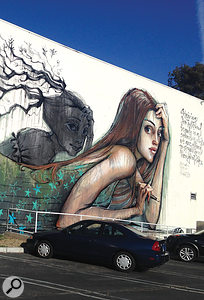 This beautifully decorated building houses LA trailer house Ignition Creative.The world’s biggest trailer houses are located along a narrow strip of northern LA running from the Pacific shore at Santa Monica and over the Hollywood hills to Burbank, close to the major movie studios. They are in effect independent advertising agencies and range in size from massive offices and warehouses with hundreds of editors to single editing suites with one or two editors. There are also a few smaller trailer houses in New York City and London, typically working on trailers for smaller films, or for international TV versions of the movie trailers.
This beautifully decorated building houses LA trailer house Ignition Creative.The world’s biggest trailer houses are located along a narrow strip of northern LA running from the Pacific shore at Santa Monica and over the Hollywood hills to Burbank, close to the major movie studios. They are in effect independent advertising agencies and range in size from massive offices and warehouses with hundreds of editors to single editing suites with one or two editors. There are also a few smaller trailer houses in New York City and London, typically working on trailers for smaller films, or for international TV versions of the movie trailers.
Competing with each other, the trailer houses cut the trailers and hope to have them approved as the final trailers. Achieving this final success is known as ‘finishing’ and looms large in the minds of trailer-makers: it’s an important badge of success and comes with the healthy fees needed to keep these agencies in business.
With strict security measures to avoid hacks, trailer house editors are cut off from the Internet behind firewalls, meaning that the only way your trailer music can get to the editors is via the all-powerful music supervisor, a gatekeeper who not only suggests what tracks to use, but controls what music goes on the internal network servers that can be accessed by the editors.
 Holly Williamson is the Vice President of Music at the LA trailer house Ignition Creative and owner/CEO of the music library Moon & Sun.Holly Williamson at Ignition Creative tells us about the trailer creation process, and how music decisions are made collectively: “The film comes into our shop, and if we are allowed to, we’ll watch the movie or at least watch selects. My music team will meet with the producer and editor and talk about tone, genre, budgets, schedule, etc. We then pitch songs we feel are best and we always try to include a group of ‘dark horse’ tracks, music that may not be expected in the mix. There are so many people competing to finish a trailer. Sometimes the studio marketing department picks the trailer, or the director of the movie or even the test group. Sometimes, it’s a little bit of all three.”
Holly Williamson is the Vice President of Music at the LA trailer house Ignition Creative and owner/CEO of the music library Moon & Sun.Holly Williamson at Ignition Creative tells us about the trailer creation process, and how music decisions are made collectively: “The film comes into our shop, and if we are allowed to, we’ll watch the movie or at least watch selects. My music team will meet with the producer and editor and talk about tone, genre, budgets, schedule, etc. We then pitch songs we feel are best and we always try to include a group of ‘dark horse’ tracks, music that may not be expected in the mix. There are so many people competing to finish a trailer. Sometimes the studio marketing department picks the trailer, or the director of the movie or even the test group. Sometimes, it’s a little bit of all three.”
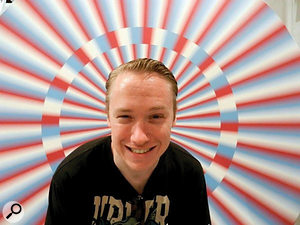 Greg Sweeney is music supervisor at LA trailer house Mob Scene.Greg Sweeney, music supervisor at Mob Scene, another key LA trailer house, tells a similar story. “Generally, the process starts with creative direction from our producer for our trailers and TV spots. We watch the film to get a sense of tone and then our producer comes up with concepts for ways to tell the film’s story within the span of a trailer. It’s the job of the supervisor to find the right music to fit the vision and tone of our producer first and foremost. Then once the music is cut in by the editor, we send the spot to our client. The client will give notes, either editorial or musical, and we address them, making changes and send it back. It goes like that version after version until either the spot finishes or is killed. All the while we continue to search for music in the likely event the client wants to hear more music options.”
Greg Sweeney is music supervisor at LA trailer house Mob Scene.Greg Sweeney, music supervisor at Mob Scene, another key LA trailer house, tells a similar story. “Generally, the process starts with creative direction from our producer for our trailers and TV spots. We watch the film to get a sense of tone and then our producer comes up with concepts for ways to tell the film’s story within the span of a trailer. It’s the job of the supervisor to find the right music to fit the vision and tone of our producer first and foremost. Then once the music is cut in by the editor, we send the spot to our client. The client will give notes, either editorial or musical, and we address them, making changes and send it back. It goes like that version after version until either the spot finishes or is killed. All the while we continue to search for music in the likely event the client wants to hear more music options.”
 Vaughn Kebler is the Executive Director Of Worldwide Music Clearance at Paramount Studio’s ‘Theatrical Marketing’ (movie trailer) department.Vaughn Kebler is the Executive Director Of Worldwide Music Clearance at Paramount Studios’ Theatrical Marketing (movie trailer) department and echoes this description of a fluid, collaborative process: “Decision-makers are in constant discussion as to what music will ultimately create an emotional connection with a movie-goer; as you are probably aware music is an emotional motivator. This process is extremely collaborative between trailer houses, creative executives and film-maker visions. The creative involvement begins with the birth of the trailer concept, and continues all the way through the process until the trailer is completed.”
Vaughn Kebler is the Executive Director Of Worldwide Music Clearance at Paramount Studio’s ‘Theatrical Marketing’ (movie trailer) department.Vaughn Kebler is the Executive Director Of Worldwide Music Clearance at Paramount Studios’ Theatrical Marketing (movie trailer) department and echoes this description of a fluid, collaborative process: “Decision-makers are in constant discussion as to what music will ultimately create an emotional connection with a movie-goer; as you are probably aware music is an emotional motivator. This process is extremely collaborative between trailer houses, creative executives and film-maker visions. The creative involvement begins with the birth of the trailer concept, and continues all the way through the process until the trailer is completed.”
Heather Kreamer, Director of Music at Create Advertising, has a very similar process. Again the key point is that it’s highly collaborative, with lots of music tried out: “When a new project arrives we sit down with the creative director, copywriter and editor and figure out our direction. I may have strong ideas, but in the end the music has to inspire everyone and cut well to picture. If this is a first trailer for a major film, we may be working on it for a year or more. In this case music can change many times. We often submit hundreds of songs before one is finally chosen. The studios work with a few trailer companies on each trailer. We are all competing to finish the trailer. The studios test and focus-group each trailer and that helps determine which one will finish.”
 Heather Kreamer is the Director Of Music at LA trailer house Create Advertising.Composer takeaway: Respect the power of the trailer-house music supervisor who, if he or she likes the music, will make sure it’s available to editors and suggest it for upcoming projects. Remember that the final choice of music is the combined decision of a trailer producer, trailer music supervisor, trailer editor, studio marketing department and sometimes the movie director and focus groups, so all you can do is make your music great and hope it wins through. Knowing that lots of tracks will be tried out should help you realise that everyone is open-minded and just wants the perfect fit. Therefore, any great music that perfectly enhances the footage has a chance of being placed on the ‘finished’ trailer.
Heather Kreamer is the Director Of Music at LA trailer house Create Advertising.Composer takeaway: Respect the power of the trailer-house music supervisor who, if he or she likes the music, will make sure it’s available to editors and suggest it for upcoming projects. Remember that the final choice of music is the combined decision of a trailer producer, trailer music supervisor, trailer editor, studio marketing department and sometimes the movie director and focus groups, so all you can do is make your music great and hope it wins through. Knowing that lots of tracks will be tried out should help you realise that everyone is open-minded and just wants the perfect fit. Therefore, any great music that perfectly enhances the footage has a chance of being placed on the ‘finished’ trailer.
On Trend
It’s been mentioned that until the ’70s trailer music came from film scores. After that, orchestral music was widely used, and then we had a phase of ‘epic music’ with huge choirs. Now we’re in an era of sound design (noises), signature sounds (very characterful noises that define the vibe of a film), trailerised cover versions and commercial songs. The trends move quickly because every studio wants their film to stand out in the marketplace, fuelling a demand for novelty. As soon as a new idea blows everyone away, everyone wants to emulate that success with something similar, this in turn meaning that to stand out the studio then needs something else fresh and amazing, and so it continues.
 The success of a single movie can kickstart a global trend in trailer music.On the need for novelty, Vaughn Kebler at Paramount Studios is wary of editors re-using a small set of pet sound design cues in their ‘bins’ (the ‘favourites’ folder in their video software): “It’s been my experience that trailer houses seem to have a ‘bin’ that they draw from and each editor has their personal favourites, and those favourites continue to make their way into trailer after trailer, almost diluting the brand.”
The success of a single movie can kickstart a global trend in trailer music.On the need for novelty, Vaughn Kebler at Paramount Studios is wary of editors re-using a small set of pet sound design cues in their ‘bins’ (the ‘favourites’ folder in their video software): “It’s been my experience that trailer houses seem to have a ‘bin’ that they draw from and each editor has their personal favourites, and those favourites continue to make their way into trailer after trailer, almost diluting the brand.”
Conor Aspell, music supervisor at Vibe Creative is enthused by the changes and surprises: “Trailer music never stays the same; someone is always doing something new or taking it to the next level. I started working in trailers after the dubstep hype (darn, missed it!). Since then, I’ve seen covers of pop songs, a resurgence of classic rock, and now mashups. I can’t believe how incredibly creative it’s all been! The trends are constantly changing and I’m always surprised to see what someone does next.”
Composer Cody Still has been keeping a close eye on the shifting tides: “The trailer industry is filled with constant change. I can recall a short period of time where ‘Epic EDM’ was all the rage. A couple of months later, it was a distant fad. One of the current trends in trailers is the use of popular songs that people know and love, modified for use in a trailer. However there are still a wide variety of styles being used; some of which are rather timeless. For instance, there is always a need for epic orchestral hybrid music, especially for action and heroic films. These are tracks with an orchestral centre, fused with modern synthesizers, sound design, drums and so on.”
 Luke Barham is a music supervisor at London trailer house Empire Design.London-based music supervisor Luke Barham (Empire Design) has noticed a shift towards both more subtle and more synthesized styles: “Where many used to focus on huge tracks that would work for Marvel or action movies, I notice more are now writing for drama and other film genres. Artists like Ludovico Einaudi and Max Richter have been a big influence, and piano-led tracks that are more minimal and delicate have come more and more to the fore. It’s almost the polar opposite to those huge trailer tracks. Neo-classical music is on the rise with artists like Nils Frahm and Olafur Arnalds. With the success of Drive and later Stranger Things there has also been a big renaissance for analogue synth-based productions too.”
Luke Barham is a music supervisor at London trailer house Empire Design.London-based music supervisor Luke Barham (Empire Design) has noticed a shift towards both more subtle and more synthesized styles: “Where many used to focus on huge tracks that would work for Marvel or action movies, I notice more are now writing for drama and other film genres. Artists like Ludovico Einaudi and Max Richter have been a big influence, and piano-led tracks that are more minimal and delicate have come more and more to the fore. It’s almost the polar opposite to those huge trailer tracks. Neo-classical music is on the rise with artists like Nils Frahm and Olafur Arnalds. With the success of Drive and later Stranger Things there has also been a big renaissance for analogue synth-based productions too.”
Composer Dylan Jones attributes the shift away from melody to a need to allow more room for dialogue in today’s more complex trailers: “As time has gone by, movies have gotten bigger and more complex, often leading to more narrative, which means that more information needs to be packed into short trailers. Due to that, trailer music has become a lot less melodic, and mostly about texture, atmosphere and harmonic emotion. It’s necessary to leave room for a lot of dialogue nowadays, something that melody doesn’t pair well with. Quick cuts for heightened intensity have also become a staple of the industry nowadays, which has caused bare-bones sound design to take charge as a necessary part of the process, something that was relatively unheard of in the early 2000s.”
Maura Duval Griffin from Audiomachine also notes that melodies have gone out of vogue: “Melodies tend to be minimal: a simple ascending scale or even a single, repeated note. As music fans and composers, we like our melodies, so we hope those come back into fashion soon!”
 Mark Petrie is a US trailer music composer.US composer Mark Petrie has an inkling that richer musical complexity may lie ahead: “I have a feeling that because we’re over-using what is very basic harmonic language, that we’ll see a swing towards integrating some degree of more complex tonality, perhaps along the lines of classic film music. We have so many movies lined up that demand that classic sound Star Wars immediately comes to mind but there are lots of other awesome sequels to look forward to. I think our technology has gotten to the point where we’re pretty close to the peak of sound creation. A sound can only become so massive, and the only ways we can go now are down or to the sides.”
Mark Petrie is a US trailer music composer.US composer Mark Petrie has an inkling that richer musical complexity may lie ahead: “I have a feeling that because we’re over-using what is very basic harmonic language, that we’ll see a swing towards integrating some degree of more complex tonality, perhaps along the lines of classic film music. We have so many movies lined up that demand that classic sound Star Wars immediately comes to mind but there are lots of other awesome sequels to look forward to. I think our technology has gotten to the point where we’re pretty close to the peak of sound creation. A sound can only become so massive, and the only ways we can go now are down or to the sides.”
Some composers and trailer music libraries have come to the conclusion that rather than chase rapidly shifting trends, it’s better just to do what you love and cross your fingers. As Jeff Fayman from Immediate Music says: “I think the trends move much quicker than when we started. It can be even monthly there’s a new style of sound being tried to stay ahead of the pack. We try to write music we love, as should any composer, and not simply try to chase the tail of trends”.
 Agus Gonzalez-Lancharro owns the Really Slow Motion trailer music library.Agus Gonzalez-Lancharro, owner of the trailer music library Really Slow Motion, also steers clear of excessive trend-following: “What really counts is that music offers certain elements that are easy to cut with. We can go on periods where the mood requested is dark, or they need a certain element throughout that creates tension, or they just want a cool signature sound, or the good old pop cover in a trailer fashion. All these trends will keep coming in cycles and nobody is going to put the industry upside down with the new Coca-Cola formula. I might sound too pessimistic but trying to force yourself to come up with the new formula is quite a naive way of thinking. Even Picasso nailed the standard painting before he started to place noses and legs in the wrong spots!”
Agus Gonzalez-Lancharro owns the Really Slow Motion trailer music library.Agus Gonzalez-Lancharro, owner of the trailer music library Really Slow Motion, also steers clear of excessive trend-following: “What really counts is that music offers certain elements that are easy to cut with. We can go on periods where the mood requested is dark, or they need a certain element throughout that creates tension, or they just want a cool signature sound, or the good old pop cover in a trailer fashion. All these trends will keep coming in cycles and nobody is going to put the industry upside down with the new Coca-Cola formula. I might sound too pessimistic but trying to force yourself to come up with the new formula is quite a naive way of thinking. Even Picasso nailed the standard painting before he started to place noses and legs in the wrong spots!”
Composer takeaway: Trends can change quickly, so do you stick to doing what you love and risk being left behind, risk seeming like a directionless follower by trying to catch trends, or risk getting nowhere by unsuccessfully trying to set trends? It starts to seem impossible if you over-think it, so the best advice is to either do what your library publisher asks you for (assuming they have good information and intuition), be inspired by something you hear, or follow your own ideas, execute them well and hope that quality rises to the top.
Sound Design
Sound design is creating processed noises — whooshes, rises, drops, atmospheres and impacts — which can be layered by an editor on top of the trailer music, or as is often the case, used to create an entire soundtrack with no music at all. Sound design is popular because it gives editors the ability to instantly multiply the emotional impact of a cut, fade or text effect by sync’ing it to an awe-inspiring whoosh or boom that shakes the room. When I began my trailer music company in 2010 we offered mostly music with some sound design, and quickly realised that the sound design was being used more than the music. In 2014 we set up an entire sub-label called Gothic Storm’s Toolworks purely to service this need. I would estimate that for every music placement, we get 20 sound-design placements, and there is a good reason for this. Heather Kreamer of Create Advertising says “We may have 90 sound-design elements in a two-minute trailer.” With one or two pieces of music to 90 pieces of sound design, it’s no wonder that sound design is doing well!
 Maura Duval Griffin is the head of music licensing at trailer music library Audiomachine.Just how much sound design is needed in a trailer will depend on the genre. Luke Barham from Empire Design explains that “An action or horror movie trailer may be led primarily by sound design rather than music,” while Maura Duval Griffin at the trailer music library Audiomachine adds that a very combined sound design-heavy musical style is now in demand: “As trends evolve in trailer music, the lines between sound design and sound design-based music cues have blurred a bit. Horror has definitely helped push that evolution, as have thrillers, sci-fi and other big action genres.”
Maura Duval Griffin is the head of music licensing at trailer music library Audiomachine.Just how much sound design is needed in a trailer will depend on the genre. Luke Barham from Empire Design explains that “An action or horror movie trailer may be led primarily by sound design rather than music,” while Maura Duval Griffin at the trailer music library Audiomachine adds that a very combined sound design-heavy musical style is now in demand: “As trends evolve in trailer music, the lines between sound design and sound design-based music cues have blurred a bit. Horror has definitely helped push that evolution, as have thrillers, sci-fi and other big action genres.”
Trailer music libraries are run by musical romantics like me who started out dreaming of epic orchestral music on a grand scale but quickly got drawn into the strange world of booms and bangs by the huge demand. Mikkel Heimbürger of Colossal Trailer Music was also a reluctant convert: “Sound design is humongous! I used to be a little annoyed by this fact, as I sometimes felt that an amazing magical orchestral track was ditched and some ‘boom bang crash’ sound-design track or element was used instead. Over time, though, I’ve learnt that sound design is really an art form in its own right.”
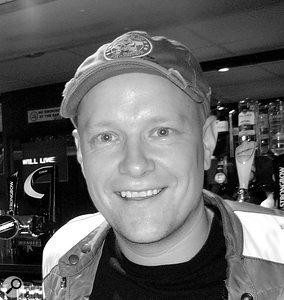 Mikkel Heimbürger is a composer of trailer music.Composer takeaway: With sound design in extremely high demand, if you can create incredible trailer noises, you have a better chance of getting major trailer placements than you would with music.
Mikkel Heimbürger is a composer of trailer music.Composer takeaway: With sound design in extremely high demand, if you can create incredible trailer noises, you have a better chance of getting major trailer placements than you would with music.
Signature Sounds & Cover Versions
A ‘signature sound’ is a piece of sound design with a highly recognisable and memorable character that conveys something special about the particular film it’s used in. As Greg Sweeney explains: “It used to be music supervisors would need to find the song of the campaign. Now it’s about finding a signature sound. Good example is the ‘bwaam’ from Inception. That’s the biggest change in how we creatively look at trailers.”
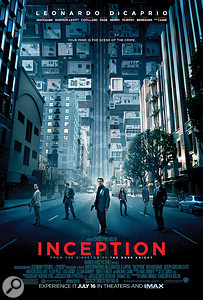 How much of the success of Inception was down to its ‘bwaammm!’ we’ll never know, but it certainly fuelled the trend for ‘signature sounds’.Another dominant trend in the last year or two is for cover versions of well-known songs to be ‘trailerised’ with a mysterious whispery vocal delivery and epic, dramatic sound design and atmospherics. As with commercial music, cover versions cannot be ‘pre-cleared’ in the way that library music is, meaning that no-one really knows if they can use a cover version until after it’s recorded. The trailer is cut with it and then the artist and their publishers are approached for approval and invited to negotiate what in some cases will be an astronomical fee.
How much of the success of Inception was down to its ‘bwaammm!’ we’ll never know, but it certainly fuelled the trend for ‘signature sounds’.Another dominant trend in the last year or two is for cover versions of well-known songs to be ‘trailerised’ with a mysterious whispery vocal delivery and epic, dramatic sound design and atmospherics. As with commercial music, cover versions cannot be ‘pre-cleared’ in the way that library music is, meaning that no-one really knows if they can use a cover version until after it’s recorded. The trailer is cut with it and then the artist and their publishers are approached for approval and invited to negotiate what in some cases will be an astronomical fee.
In income terms it’s worth noting that although the original artist might be looking for more than $100,000, the creator of the cover version can also expect to negotiate up to $100,000 if it’s a big-budget blockbuster and the studio are already emotionally committed to their wonderful cover. However, composer Dylan Jones is not convinced the covers boom will last: “If anything currently trending were to die out in the next few years, I think covers would be it. I think it’s just a fad that will fall out of style once everyone realises that it’s been done way too much.”
Composer takeaway: It’s a long shot, but you might be able to get in on the covers trend by recording a stunning trailerised version of your favourite song and sending it to the LA trailer houses. If they use it and the artist approves it, you’ll end up with an awesome placement credit and possibly a few tens of thousands of dollars in your pocket for your troubles.
Trails Of Glory
In this first half of our epic epic-music survey you’ve caught up with the history of Hollywood trailer music, peered behind the screen at its inner workings and perhaps got a taste for pursuing this daunting path. Next month we will delve into the composing side, describing the type of music needed, techniques of creating it, how to get started, methods of placing it with trailer music companies and the large alternative worldwide sources of income that offset the lottery-style odds of hitting the Hollywood big time (plot-spoiler: 80 percent of your ‘trailer music’ income will come from non-Hollywood sources like international TV, streaming income from Spotify and ad revenue from YouTube).
In the meantime, go to Spotify and listen carefully to music by the trailer music libraries mentioned in the history section above and watch some recent, powerful, overwhelming big-budget movie trailers — preferably loud with a subwoofer to hear the all-important bottom end. Try to calm your primal excitement, and instead listen to the music and sound that’s been chosen by the rigorous collaborative selection process described earlier in this article. And let’s invite the late Don LaFontaine back to this world for one last voiceover:
“In a world... where everyone is chasing each other’s trends while paradoxically trying to sound special, where the perfect track for a trailer is a needle in a haystack worth millions in box office revenue, and where a composer’s success is measured in the hundreds of thousands of dollars, there is one unlikely hero poised to change the trailer music world forever with a dazzling new twist. And just perhaps that hero...
“...is you!”
All About Library Music: Part 1 Getting Started
All About Library Music: Part 2 The Business
All About Library Music: Part 3 The Composer
All About Library Music: Part 4 The Client
All About Library Music: Part 5 Networking
All About Library Music: Part 6 Hollywood Trailers
Trailer Types
There are several types of movie trailer. The long official trailers are known as ‘theatrical’ trailers because they play in movie theatres, or cinemas as we in Britain say. Other versions of movie trailers include online and TV spots (a US word for advert). As well as making movie trailers, the same LA trailer houses also tend to create trailers for games and TV shows, the latter being known in the US and UK as ‘promos’. There are also ‘behind the scenes’/‘making of’ promotional shorts created by the trailer houses which need music.
Theatrical trailers command the highest fees, which can mean up to $100,000 for a long musical track on a theatrical trailer for a big-budget blockbuster. At the other end of the scale, the money goes down into the hundreds for, say, a small whoosh sound on a low budget film’s ‘behind the scenes’ video or TV promo.
Composer takeaway: To collect the big winnings, you want to have a long musical track used in a big-budget blockbuster theatrical trailer. Of course you do — you and thousands of others. Still, if you create amazing music you’re in the running and if you don’t get top prize there are plenty of other types of trailer that still pay well.
‘Trailerised’ Commercial Songs
One current trend is for original (not cover) artists past and present to see their hit songs placed in Hollywood trailers. These may be ‘trailerised’ (also referred to as ‘augmented’), that is, layered by trailer editors with impressive sound design that adds cinematic size for theatrical sound systems.
The high fees offered by studios are a factor in this trend, but it can also be attributed to the fact that trailers have become increasingly cool, with millions of fans around the world, making previously cagey bands much more receptive. Holly Williamson of Ignition Creative recalls: “I once tried to license a popular band for a trailer and they refused even though the money was very good. Finally, a couple years later, they wised up and started licensing their music. Trailers are an excellent way to promote a new album. Anyway, a year after that, the manager of the band called me asking me if this band could do original music for the trailers I worked on. Three years earlier, they wouldn’t return a call. Times have changed.”
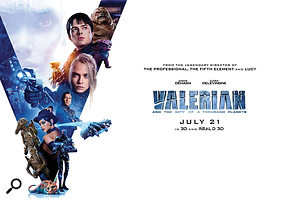 ‘Because’ by the Beatles was used to stunning effect in the trailer for Valerian And The City Of A Thousand Planets.Heather Kreamer at Create Advertising tells us about the stunning moment a Beatles track was first placed in a trailer, to amazing effect: “We worked on the Valerian campaign and decided to use the Beatles’ ‘Because’ and then build a trailer cue around it. This was risky, as we had no idea if the song would be approved or if we could afford it. In the end Paul McCartney and Ringo Starr watched our trailer and gave their approval. We were the first people to do this to a Beatles song and it was a true honour.
‘Because’ by the Beatles was used to stunning effect in the trailer for Valerian And The City Of A Thousand Planets.Heather Kreamer at Create Advertising tells us about the stunning moment a Beatles track was first placed in a trailer, to amazing effect: “We worked on the Valerian campaign and decided to use the Beatles’ ‘Because’ and then build a trailer cue around it. This was risky, as we had no idea if the song would be approved or if we could afford it. In the end Paul McCartney and Ringo Starr watched our trailer and gave their approval. We were the first people to do this to a Beatles song and it was a true honour.
“These days, most artists want to be involved in trailers, which is wonderful for us. This wasn’t the case when I started 11 years ago. Now we are starting to see a trend of remixing iconic songs and this can be a lot of fun as it allows us to work with songs that are dear to our hearts. I think we will see a lot more of this in the future. No matter what song or library cue we are using, we usually will embellish it to fit our project.”
Composer takeaway: As an ‘in’ to getting your songs placed in trailers, one trick could be to become a world-famous rock star with profound hit songs that make beautiful film stars look even cooler. Or, which is slightly easier, you could create library sound design that gets added under the rock stars’ kick drums and still get a reasonable payout.
